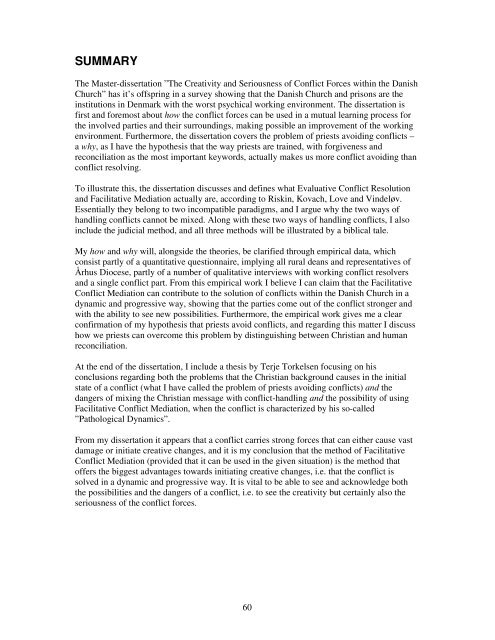konfliktkræfternes kreativitet og alvor i folkekirken - fire-sogne
konfliktkræfternes kreativitet og alvor i folkekirken - fire-sogne
konfliktkræfternes kreativitet og alvor i folkekirken - fire-sogne
Create successful ePaper yourself
Turn your PDF publications into a flip-book with our unique Google optimized e-Paper software.
SUMMARY<br />
The Master-dissertation ”The Creativity and Seriousness of Conflict Forces within the Danish<br />
Church” has it’s offspring in a survey showing that the Danish Church and prisons are the<br />
institutions in Denmark with the worst psychical working environment. The dissertation is<br />
first and foremost about how the conflict forces can be used in a mutual learning process for<br />
the involved parties and their surroundings, making possible an improvement of the working<br />
environment. Furthermore, the dissertation covers the problem of priests avoiding conflicts –<br />
a why, as I have the hypothesis that the way priests are trained, with forgiveness and<br />
reconciliation as the most important keywords, actually makes us more conflict avoiding than<br />
conflict resolving.<br />
To illustrate this, the dissertation discusses and defines what Evaluative Conflict Resolution<br />
and Facilitative Mediation actually are, according to Riskin, Kovach, Love and Vindeløv.<br />
Essentially they belong to two incompatible paradigms, and I argue why the two ways of<br />
handling conflicts cannot be mixed. Along with these two ways of handling conflicts, I also<br />
include the judicial method, and all three methods will be illustrated by a biblical tale.<br />
My how and why will, alongside the theories, be clarified through empirical data, which<br />
consist partly of a quantitative questionnaire, implying all rural deans and representatives of<br />
Århus Diocese, partly of a number of qualitative interviews with working conflict resolvers<br />
and a single conflict part. From this empirical work I believe I can claim that the Facilitative<br />
Conflict Mediation can contribute to the solution of conflicts within the Danish Church in a<br />
dynamic and pr<strong>og</strong>ressive way, showing that the parties come out of the conflict stronger and<br />
with the ability to see new possibilities. Furthermore, the empirical work gives me a clear<br />
confirmation of my hypothesis that priests avoid conflicts, and regarding this matter I discuss<br />
how we priests can overcome this problem by distinguishing between Christian and human<br />
reconciliation.<br />
At the end of the dissertation, I include a thesis by Terje Torkelsen focusing on his<br />
conclusions regarding both the problems that the Christian background causes in the initial<br />
state of a conflict (what I have called the problem of priests avoiding conflicts) and the<br />
dangers of mixing the Christian message with conflict-handling and the possibility of using<br />
Facilitative Conflict Mediation, when the conflict is characterized by his so-called<br />
”Pathol<strong>og</strong>ical Dynamics”.<br />
From my dissertation it appears that a conflict carries strong forces that can either cause vast<br />
damage or initiate creative changes, and it is my conclusion that the method of Facilitative<br />
Conflict Mediation (provided that it can be used in the given situation) is the method that<br />
offers the biggest advantages towards initiating creative changes, i.e. that the conflict is<br />
solved in a dynamic and pr<strong>og</strong>ressive way. It is vital to be able to see and acknowledge both<br />
the possibilities and the dangers of a conflict, i.e. to see the creativity but certainly also the<br />
seriousness of the conflict forces.<br />
60


